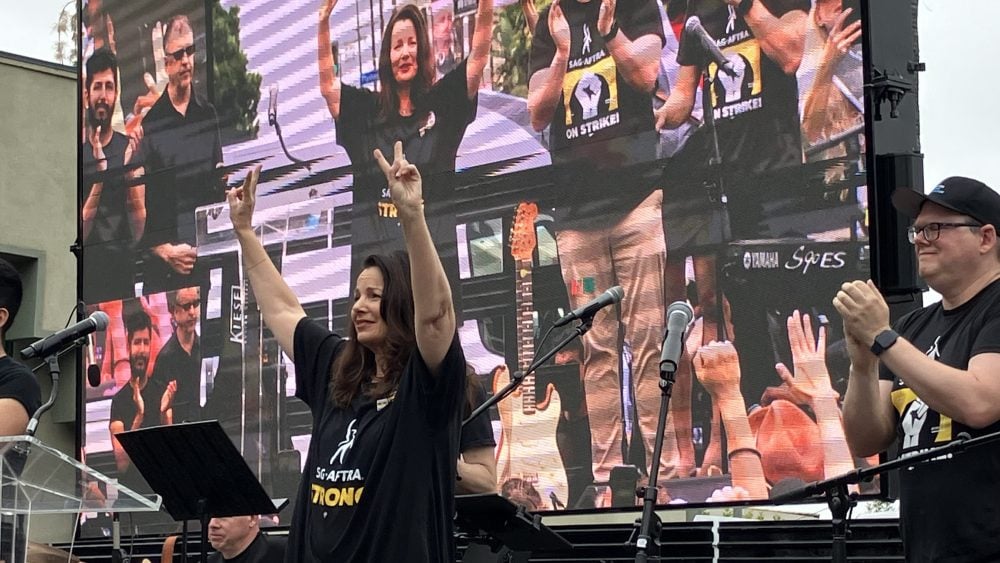SAG-AFTRA held a massive march and rally outside the Paramount studio on Wednesday, as the union marked 62 days on strike.
Union leaders argued that the strike has resonated across industries, as workers stand up to “unchecked corporate greed.”
“What’s at stake is bigger than just the entertainment industry,” said Duncan Crabtree-Ireland, the union’s executive director. “It’s about the livelihoods of everyone who needs a job to earn a living.”
He urged actors to use their voices and authenticity to speak for the broader labor movement.
“This is your time,” he said.
Lorena Gonzalez, the executive secretary-treasurer of the California Labor Federation, said that the union’s push to regulate artificial intelligence is relevant to other industries. She cited efforts to replace big-rig drivers and Ralphs checkout workers with robots.
“AI is not just an actor issue. It’s not just a writer issue,” Gonzalez said. “The threat of robots taking over human interaction is an issue in every workplace in California. And it’s about time somebody stood up to them at the bargaining table and said, ‘We’re not going to take it anymore.’”
Love Film & TV?
Get your daily dose of everything happening in music, film and TV in Australia and abroad.
Fran Drescher, the president of SAG-AFTRA, acknowledged that the strike has been hard, and said it will get harder. But she argued that it will have a historic impact.
“What we need to do actually, is change the culture,” Drescher said. “We are going to make history so generations from now, they’re going to be talking about us right here and right now. Because we changed the course of history.”
Frances Fisher, a member of the SAG-AFTRA negotiating committee, said the union is pushing for legislation in Sacramento that would invalidate any contract that allows the use of AI on actors’ likenesses, if it was signed without the involvement of a lawyer. The union is also pushing for state legislation that would grant unemployment benefits to striking workers, which, if passed would take effect on Jan. 1.
Fisher said she preferred the environment at the rally to the confines of the Alliance of Motion Picture and Television Producers negotiating room in Sherman Oaks.
“t feels a heck of a lot better out here with you guys on the picket line than sitting in a hermetically sealed, fluorescent lit, windowless room — working hard, but not taken seriously by the lawyers across the table,” Fisher said. “This is serious. And they know it. Oh, yeah. We don’t fuck around.”
SAG-AFTRA has not had any formal talks with the AMPTP since declaring the strike on July 13. The AMPTP has spent more than a month focused on trying to get a deal with the Writers Guild of America, which has been on strike for 135 days.
Those efforts have not borne fruit, but the studio alliance has yet to turn its attention back to the actors.
After the rally, Crabtree-Ireland said there have been backchannel talks with AMPTP leadership.
“There’s obviously conversations that happen but there is no planned return to the bargaining table,” he said. “There’s been no request for that from them. I’ve been requesting it, as you know, like every fricking day.”
In addition to the AI regulations, the union is pushing for an 11% increase in guild minimums to keep pace with inflation, and a 2% cut of the revenue attributed to each show on any streaming platform.
“Do not give up because this is the moment that is going to change the future,” Drescher said. “And if we don’t start getting a piece of that pie, then what are we doing?”
The AMPTP has offered to share streaming viewership data with the WGA, but has refused to link residuals to the success of shows on streaming. The AMPTP has suggested that the WGA use the data to return in three years with a proposal for a performance-based streaming residual.
Crabtree-Ireland called the AMPTP’s data transparency proposal “a very good step forward,” but said that neither SAG-AFTRA nor the WGA can wait three years for a success-based streaming formula.
“No money for three years?” he said. “We’re not going to do that. They’re not going to do that. No. Of course not.”
From Variety US































